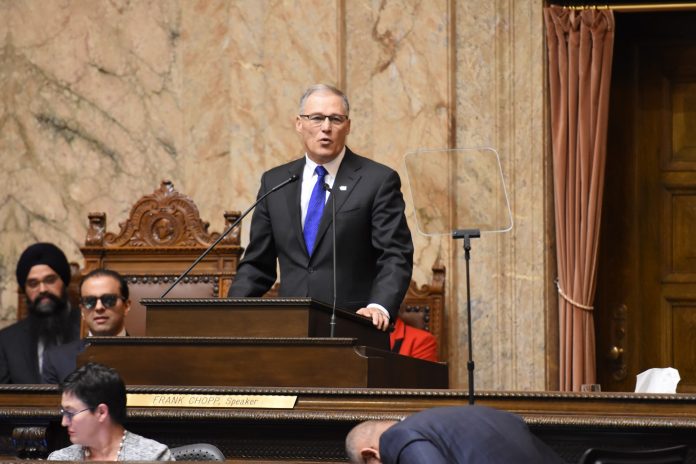Washington renters breathed a sigh of relief yesterday as Governor Jay Inslee announced a rent freeze lasting two months. The governor also extended the eviction moratorium that he first issued in mid-March to June 4th as well.
“All it took was a pandemic to get rent control in Washington state,” tweeted Devin Silvernail, who founded Be:Seattle, a tenant rights group which hosted a series renter bootcamps (including one with The Urbanist) last year.
Silvernail and other tenant advocates noted that struggling renters will continue accruing debt during the rent freeze and emphasized that more work remained to be done to protect them.
“Didn’t think a pandemic is how we get rent control (temporary *at the moment*), but I know that this is setting stage for stronger tenant protections,” tweeted Xochitl Maykovich, political director with Washington Community Action Network (Washington CAN).
Rent control has been banned in Washington state since 1981, but momentum seems to be swinging in the other direction. Skyrocketing rents over the past decade are a compelling argument in their own right, but pressure also mounted on Washington after our neighbor to the south in Oregon passed rent stabilization in 2019. For a primer on rent control economics read this.
While it’s not rent control or rent cancellation, Governor Inslee’s order did ban late fees and include a stipulation that landlords work out “a reasonable repayment plan to enforce any collection of that debt.” The rent freeze also applies to commercial tenants, giving struggling small business owners some help as well.
The risk that rents would rebound after the freeze remains–although the recession might put some downward pressure on rents–silver linings. Either way, advocates are seeking to build on this momentum and press for more protections and assistance.
“There’s going to be a special session at some point and we MUST fight to *at minimum* to keep the ban on rent control lifted and give local control. We *should* fight to continue any form of statewide stabilization. After a cap, landlords might go for inflation,” Silvernail said in a tweet, adding “And in the meantime, we still need to work together to cancel rent and cancel mortgage for residential and commercial properties.”
Nationally Rep. Ilhan Omar (D-Minneapolis) unveiled on a bill to cancel rent during the Covid-19 crisis. The rent cancellation would be retroactive back to April and help the estimated 31% of Americans who could not pay rent at the start of the month. Omar’s bill would have the Federal government cover losses to landlords if they agree to fair renting and lending practices for five years.
“The National Low Income Housing Coalition estimates it would cost about $76.1 billion over 12 months to provide relief to the 11.5 million people who are already or soon will become severely housing cost-burdened,” the Guardian reported.
Unemployment filings have spiked to 22 million after another 5.2 million Americans filed last week. Ideas like rent control and a major surge in public housing that formerly seemed fringe and far-fetched are increasingly coming into mainstream consideration. It’s a weird time to be alive.
Doug Trumm is publisher of The Urbanist. An Urbanist writer since 2015, he dreams of pedestrian streets, bus lanes, and a mass-timber building spree to end our housing crisis. He graduated from the Evans School of Public Policy and Governance at the University of Washington in 2019. He lives in Seattle's Fremont neighborhood and loves to explore the city by foot and by bike.



